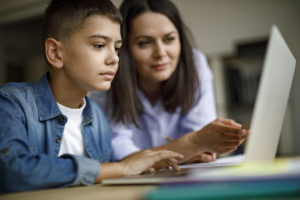Social Media Sparks Dangerous Trend of Mental Health Self-Diagnosing

As the topic of mental health has come to the forefront of many conversations, it’s also become a popular topic on social media. Posts about mental health are spreading quickly on social media platforms — from experts seeking to share important information, to others simply hopping on the trend. Being able to decipher which information is accurate and helpful and which is harmful is key to helping youth navigate their online presence and its impact on their mental wellness.
Some posts on social media can illustrate the reality and vulnerability of mental illness. Unfortunately, other posts can confuse young people with self-diagnosis and advice delivered from social media users and influencers who aren’t licensed healthcare professionals.
Let’s explore the pros and cons of mental health content on social media, and how caregivers can help children and teens navigate it all.
The Risks of Mental Health Content on Social Media

Laurel Phillips, Associate Clinical Director at Camber Kansas City
Laurel Phillips, Associate Clinical Director at Camber Kansas City (previously KVC Hospitals Kansas City), sees two perspectives of mental health content on social media. “On one side, I see actual clinicians offering really good tips,” she explains. “On the other hand, there are people sharing self-diagnoses.” Navigating mental health content on social media is difficult enough for adults, let alone young people who are still forming media literacy. So it’s understandable that some may struggle as they consume this content.
In some ways, mental health content on social media is positive. People sharing about their own challenges can destigmatize mental health and help others feel less alone in their own struggles or diagnosis. These kinds of posts can also raise awareness.
Despite the benefits of destigmatizing mental health and sharing beneficial information, this kind of content also comes with risks. One critical risk is self-diagnosis. Some of these posts or videos list possible warning signs to look out for, or symptoms of a disorder, which can be helpful for education and awareness. But the issue arises when the posts encourage viewers to self-evaluate and they don’t stress the importance of professional assessments.
“Mental health in any form of media can be misrepresented,” Laurel explains. If someone’s concerned they have a mental health challenge, I encourage them to seek guidance and treatment from a professional rather than social media.”
Because symptoms and disorders look different in everyone, diagnosing yourself with a mental illness based on someone else’s experience, symptoms, or social media post lacks credibility. With posts like these coming from influencers who have big followings and who aren’t mental health experts, it can be easy to be led in the wrong direction.
Then there’s the sheer volume of content, which can quickly put children on a slippery slope. Social media platforms are designed to keep users engaged, so users are delivered content that matches their patterns. Reading a few posts or watching a few videos may not be problematic, but an hour of content about a possible diagnosis can be very misleading and convincing.
Separating Influencers From Licensed Professionals
Another problem? People making mental health-related posts aren’t necessarily following the same code of ethics as a licensed mental health professional. “We adhere to a code of ethics because we serve a vulnerable population,” Laurel notes. “If you’re following an influencer and they’re responding to your comments, that may be walking a tricky line of advice and expert medical knowledge.”
When it comes to mental health, it is crucial to only receive a diagnosis from a medical doctor and/or licensed mental health professional.
Inside Healthy Social Media Use
While it comes with risks, mental health content on social media can also be helpful for young people facing the challenges and stresses of today. Seeing other people face the same difficult experiences can help children feel less alone as they discover their own mental health.
 Social media content about mental health also gives youth the opportunity to learn healthy, constructive coping skills. Simply while scrolling they may learn helpful tips for managing anxiety or functioning with attention-deficit hyperactivity disorder (ADHD), for example.
Social media content about mental health also gives youth the opportunity to learn healthy, constructive coping skills. Simply while scrolling they may learn helpful tips for managing anxiety or functioning with attention-deficit hyperactivity disorder (ADHD), for example.
The key to being able to enjoy these benefits is building social media literacy. Here are a few important lessons to teach kids as they navigate mental health content on social media.
- Teach youth the difference between an expert and an influencer: Help them find examples of each, so it’s easier for them to determine trustworthy sources independently.
- Caution kids on developing trusting relationships with people online: A few well-meaning comments can unintentionally give children and teens the wrong impression of a strong friendship with an influencer.
- Remind youth not to compare themselves to social media highlight reels: Social media feeds are curated and don’t always show the full picture. It’s important for kids to remember this when they start comparing themselves to others.
- Help kids understand that many influencers are on social media to make money: An influencer may appear authentic, but their post content is designed to boost engagement. This understanding is an important part of building social media literacy.
- Connect children with a true mental health expert: Only a real mental health expert can offer a diagnosis, therapy and counseling.
Laurel recommends limited or no social media use for children under the age of 10. If they are using social media, it should be with the support of a caregiver or trusted adult. For ages 11 and up, Laurel says to focus on balancing their time spent on social media and their time spent engaging in social interactions in person. For every 30 minutes on social media, help them spend 30-45 minutes engaging in person with someone in the home, a neighbor, friend, or anyone else.
Also, be considerate of the times of day they are using social media. Limit use to only 30 minutes or less before bedtime, and limit morning use until after they have had breakfast and gotten ready for the day.
What You Can Do to Help Kids with Mental Health and Social Media
As a caregiver, it’s all about modeling our own behaviors — so to encourage smart social media use for children, showing them a good example goes a long way. Here are a few tips for creating a social media framework that supports your family:
- Consider social media as a reward for homework or chore completion: This helps children remember that social media is a privilege and something to be used in moderation.
- Set household rules for having no phones at the dinner table or at other family activities: It’s easier to resist the temptation of social media when everyone in the home is screen-free during designated times (yes, caregivers included!).
- Build a routine with a good mix of in-person interaction: Make sure children have ample opportunities outside the school day to build relationships and connect with people live and in person. Strong interpersonal relationships can help keep things in perspective and social media use in check.
- Keep an open door policy and invite kids to share their thoughts or feelings: Children need to know they can depend on their caregivers as safe and trustworthy go-tos if social media use does become a struggle. Take time to listen empathetically.
- Take breaks from social media and content consumption: Modeling healthy social media use is a great way for caregivers to show their children how to establish good habits.
By implementing these ideas, you’ll be better prepared to help your child navigate social media and their mental health wellness.
About Camber (Previously KVC Hospitals)
For 30 years, Camber (previously KVC Hospitals) has helped thousands of kids and teens achieve mental health wellness through expert and compassionate treatment. Camber uses a patient-centered approach that works to heal the whole family unit when a child is struggling with depression, anxiety, suicidal thoughts, self-harming, the impacts of trauma, and other mental health needs. To learn more about our therapeutic services, visit cambermentalhealth.org or call us at 913-890-7468.





